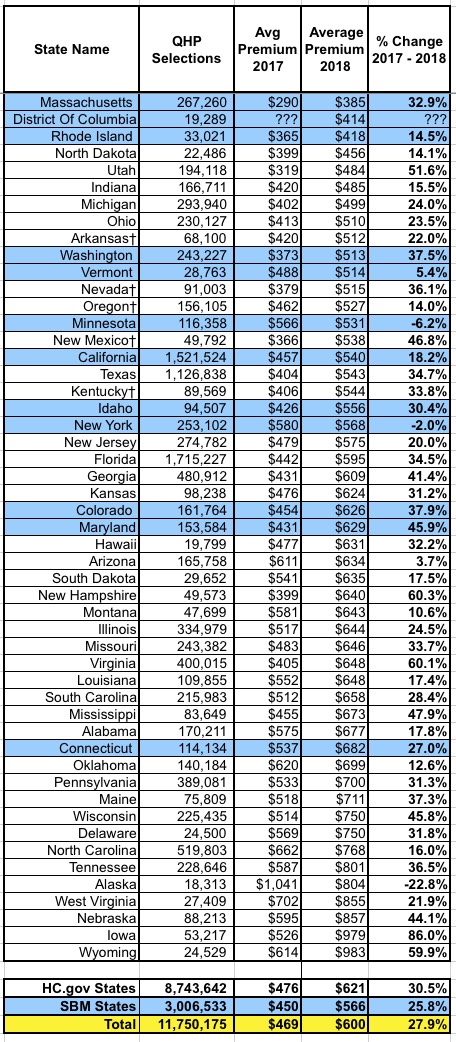Which state has the least-expensive ACA policies? Take a guess. No, guess again.
This post was inspired by a Twitter query by "Other Alex". He originally asked about the insanely expensive premiums for ACA policies in Charlottesville, Virginia, which I wrote about the other day. Anyway, after some back & forth between him, myself and Colin Baillio, Alex asked if I knew where the least-expensive ACA plans are.
I haven't looked it up by rating area yet (for instance, Virginia as a whole ranks 18th most expensive this year even though Charlottesville is the most expensive rating area in the country), but on a state-level basis, it appears that the least expensive state for ACA-compliant individual healthcare policies is actually...(drumroll please)...
Massachusetts.
Yep, it hadn't really occurred to me before, but I double-checked the official 2018 CMS Public Use File, and sure enough, when you check Tab 5 (which lists stuff like average premiums, APTC subsidies, CSR assistance and so on) and sort the states by "Average Premium", voila: Massachusetts, average premium per enrollee before ACA subsidies: $385/month.
The reasons for this, I'm sure, have much to do with things unique to the Massachusetts set-up; for instance, they (along with Vermont) offer some additional state-based financial subsidies to many enrollees, and of course Massachusetts already had an Obamacare-like law in place for several years prior to the ACA being passed (you may remember it...some guy named "Mitt" was governor at the time...), but whatever the reason, the Bay State now has the least-expensive full-price ACA policies in the country. Imagine that.
The most expensive state, by the way, is no longer Alaska, thanks primarily to their successful reinsurance program; it's actually Wyoming ($983/month on average).
It's important to note three important caveats:
- These averages only include on-exchange enrollees (there's ~4.5 million enrolled in ACA policies off-exchange; their averages might be higher or lower)
- They refer to the full, unsubsidized premiums (not including APTC subsidies, which around 85% of exchange enrollees receive)
- They don't take into account deductibles, co-pays or other out-of-pocket expenses (and therefore don't include CSR assistance either)
Having said that, here's the states ranked from lowest to highest for 2018:




